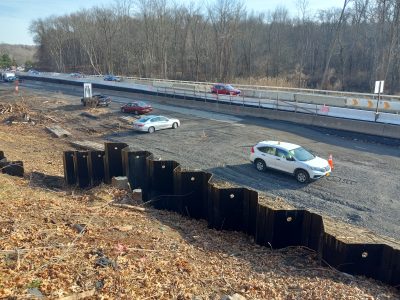Saw Mill Parkway Project Mercifully Nears Completion
News Based on facts, either observed and verified directly by the reporter, or reported and verified from knowledgeable sources.

For two years residents living near the Saw Mill Parkway in Pleasantville and Mount Pleasant have endured day-long ear-splitting noise from pile drivers and generators and the nighttime glare of floodlights.
The jarring disturbances were from construction by the state Department of Transportation (DOT) working to raise two bridges to alleviate severe flooding during heavy rains. Elevating the roadway to mitigate 100-year flood projections for that stretch of the parkway that was notorious for serious flooding during significant rain events was crucial.
But the untenable situation for residents near the 1.3-mile stretch of construction will soon be over.
Pleasantville Village Administrator Eric Morrissey said last week that work on both the northbound and southbound lanes should be completed in the next two to three weeks after he had an informal conversation with the project manager.
“I was told that the paving operations should be completed in two weeks and both lanes should be open,” he said.
The project has also caused extensive traffic congestion on the parkway and in the village. According to Gibson Craig, who lives about 100 feet from construction on Pollywiggle Lane in Pleasantville, the work seems to be slowing down.
“The project is scaling back but they still have to complete the landscaping and work around the Marble Avenue entrances,” Craig said.
Recently the Bedford Road exit was reopened and the barriers were removed.
Most frustrating for residents and local officials was how the DOT was unresponsive to addressing noise, environmental and quality-of-life issues for countless Pleasantville and Mount Pleasant residents. Many of the most affected residents lived on streets that directly faced the parkway.
Craig and his wife, Danielle, started an online petition in March 2021 that quickly collected nearly 500 signatures and brought much-needed attention to the situation.
“The petition connected those of us in the impacted neighborhoods and ultimately attracted the support of nearly a dozen politicians,” Craig said. “This helped us restore the nightwork ban, implement a flood mitigation project on Hopper Street and plant trees at Parkway Field.”
Planting trees at Parkway Field on Marble Avenue by the DOT made up for the line of trees that were clear-cut along the parkway to extend the drainage.
The petition also fueled the efforts of state Sen. Peter Harckham (D-Lewisboro) and Assemblyman Tom Abinanti (D-Pleasantville) who pushed the DOT to end nightly work by 10 p.m. rather than continue past midnight.
Craig, an engineer, said it’s clear the DOT’s design-build process needs to be reviewed and reformed, particularly in environmentally sensitive areas.
“The original project on paper was classified as a minor rehabilitation project, which means it didn’t require a state Environmental Quality Review (SEQR),” he said. “But the way it turned out, the project evolved a lot with increased environmental impact, like the introduction of 5,000 pressure-treated piles that raised the road eight feet near homes. This made it clear it wasn’t a minor rehabilitation project and a SEQR would’ve guaranteed a far better outcome to the whole project.”
By classifying it as minor rehabilitation, the DOT was not required to run a sound impact study. Numerous requests were made to install sound barriers only to be told by the department that the project “does not meet Federal Highway Administration requirements for additional sound mitigation measures.”
For many, the $60 million project has exposed the DOT’s indifference to a community that has been negatively impacted by around-the-clock construction. Mount Pleasant Supervisor Carl Fulgenzi and Pleasantville Mayor Peter Scherer along with their respective municipal boards requested the DOT attend a meeting to address residents and answer questions. The DOT responded in writing that the department “was in compliance with all regulations.”

Abby is a seasoned journalist who has been covering news and feature stories in the region for decades. Since The Examiner’s launch in 2007, she has reported extensively on a broad range of community issues. Read more from Abby’s editor-author bio here. Read Abbys’s archived work here: https://www.theexaminernews.com/author/ab-lub2019/
